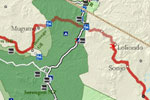
Female lion with wildebeest kill in Tanzania. A decline in the wildebeest population would impact species up and down the food chain. Photo by: Rhett A. Butler.
A regional case against the construction of a proposed road through Serengeti National Park has moved to trial after a judge with the East African Court of Justice (EACJ) threw out concerns by Tanzania reports the Daily Nation. The government of Tanzania has proposed a controversial highway that would bifurcate the northern part of the Serengeti National, only to see their plans stalled by a lawsuit filed by the Kenyan-based NGO, Africa Network for Animal Welfare (ANAW), which argues that the road could have massive consequences for the entire Serengeti ecosystem, a view shared by many scientists.
“The court has jurisdiction to hear environment disputes which directly affect the ecosystem and touch on the sustainable utilization of the natural resources, including terrestrial ecosystems,” Judge James Ogola said in his ruling, essentially tossing out Tanzania’s argument that the issue was a national one, and not regional.
Scientists say the road project will significantly harm the world’s largest migration. A 2011 study found that the wildebeest herd, which currently numbers over a million, could be cut down by a third. Such a loss would ripple through the ecosystem affecting populations of many of the plains’ species, including big predators.
In addition, a leaked government study estimated that by 2015, 800 vehicles per day would cross the proposed 30 mile (50 kilometer) stretch of the park. By 2035, the number of vehicles per day is expected to rise to 3,000, or well over a million a year.
The current road plans have raised concerns among the UN, the World Bank, and the German government, each of which has tried to find a solution, including proposing to fund commercial routes that would go around the ecosystem.
Last June brought confusion as it appeared the Tanzania government had dropped its road-building plans in the Serengeti. However, within a week it appeared little had changed. The government argues the road will not be paved, but conservationists say that if built the road would inevitably be paved, widened, and fence given population and commercial pressures.
No date is set yet for the trial to begin.
Related articles
Richard Leakey: ‘selfish’ critics choose wrong fight in Serengeti road

(07/02/2011) The controversial Serengeti road is going ahead, but with conditions. According to the Tanzanian Minister for Natural Resources and Tourism, Ezekiel Maige, the road will not be paved and it will be run by the Tanzanian park authority who will have the power to monitor traffic to ‘ensure no harm comes to the wildlife population’. Critics argue that even an unpaved road would eventually cripple the largest land migration in the world. However, famed Kenyan conservationist, ex-politician, and anthropologist, Richard Leakey, told mongabay.com that critics of the road are focusing on the wrong fight while failing to respect Tanzania’s right to develop. Leakey says that instead of attempting to stop the road from being built, which he believes is inevitable, critics should instead focus on funding a truly wildlife-friendly road.
Unpaved road through Serengeti to progress

(07/02/2011) After a week of confusion, the Tanzanian government has finally clarified its position on the hugely-controversial Serengeti road. The Minister for Natural Resources and Tourism, Ezekiel Maige, confirmed that a paved highway will not be built through the northern Serengeti National Park, however the government is still planning to construct a gravel road through the park. Yet critics have long warned that even an unpaved road would open Pandora’s box: eventually commercial and population pressure would push the road to be paved, widened, and fenced leading to a collapse of the world’s largest remaining-and most famous-land migration. Two million wildebeest, zebra, and Thomson’s gazelle pass along this route in annual migration from Tanzania to Kenya.

(04/14/2011) What’s happening in Tanzania? This is a question making the rounds in conservation and environmental circles. Why is a nation that has so much invested in its wild lands and wild animals willing to pursue projects that appear destined not only to wreak havoc on the East African nation’s world-famous wildlife and ecosystems, but to cripple its economically-important tourism industry? The most well known example is the proposed road bisecting Serengeti National Park, which scientists, conservationists, the UN, and foreign governments alike have condemned. But there are other concerns among conservationists, including the fast-tracking of soda ash mining in East Africa’s most important breeding ground for millions of lesser flamingo, and the recent announcement to nullify an application for UNESCO Heritage Status for a portion of Tanzania’s Eastern Arc Mountains, a threatened forest rich in species found no-where else. According to President Jakaya Kikwete, Tanzania is simply trying to provide for its poorest citizens (such as communities near the Serengeti and the Eastern Arc Mountains) while pursuing western-style industrial development.
Serengeti road project opposed by ‘powerful’ tour company lobby
(03/16/2011) Government plans to build a road through Serengeti National Park came up against more opposition this week as the Tanzanian Association of Tour Operators (Tato) came out against the project, reports The Citizen. Tato, described as powerful local lobby group by the Tanzanian media, stated that the road would hurt tourism and urged the government to select a proposed alternative route that would by-pass the park. Tato’s opposition may signal a shift to more local criticism of the road as opposition against the project has come mostly from international environmentalists, scientists, and governments.
Leaked government study: road will damage Serengeti wildlife, despite president’s assurances
(02/10/2011) Tanzania’s President, Jakaya Kikwete, today gave promises that his proposed road project, which will bisect the Serengeti plains, would not hurt one of the world’s most famed parks and one of its last great land migrations. “The Serengeti is a jewel of our nation as well as for the international community. […] We will do nothing to hurt the Serengeti and we would like the international community to know this,” Kikwete said in a statement reported by the AFP. However, a government environment impact study, leaked to the conservation organization Serengeti Watch, paints a very different picture of how the road will damage the Serengeti. The report includes warnings that the road will ‘limit’ the migration of the plains’ 1.5 million wildebeest and 500,000 other herbivores including zebra.
Scientists: road through Serengeti would likely end wildebeest migration
(02/02/2011) A new study finds that a proposed road cutting through Serengeti National Park would likely have devastating consequences for one of the world’s last great migrations. According to the study the road itself could lead to a 35% loss in the famed park’s migrating wildebeest herd, essentially cutting the herd down by over half a million animals. Despite such concerns, and the availability of an alternative route that would bypass the Serengeti plains altogether, the Tanzanian government has stated it is going ahead with the controversial road.







